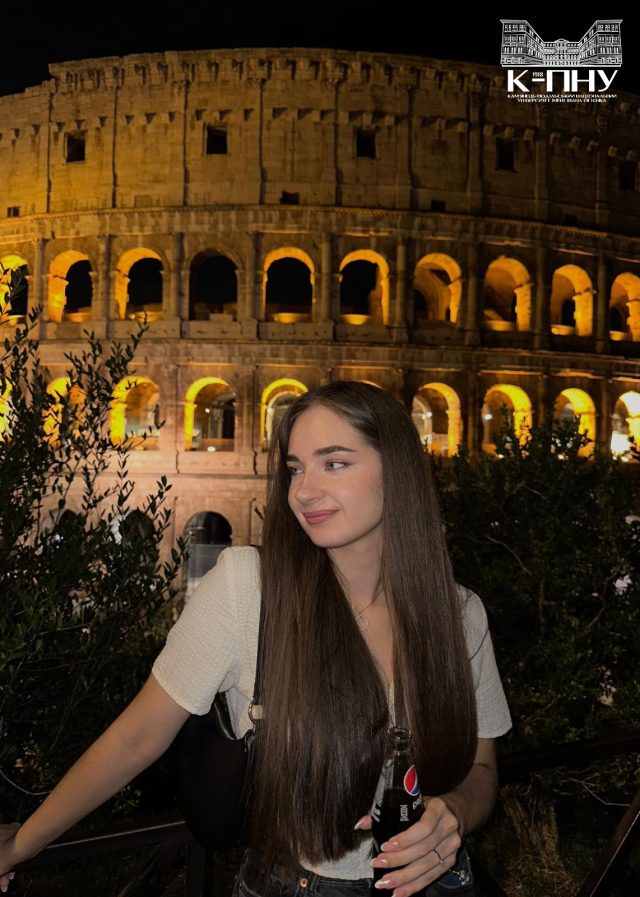
Tetiana Moiseieva, a student at the Faculty of Foreign Philology specializing in 035 Philology (035.041 Germanic Languages and Literature (translation included), first – English), is currently studying at one of the most prestigious universities in the world, Sapienza University of Rome (Italy). As part of the EU Erasmus+ Program, she is spending the first semester of the 2024-2025 academic year at the Faculty of English and Anglo-American Studies. Tetiana shared her thoughts on her academic mobility experience:
“For the past two months, I’ve been studying at Sapienza University as part of the Erasmus+ academic mobility program. This is my second academic mobility experience, and it’s been remarkably different from my first, both in terms of the learning approach and adapting to a new environment.
Sapienza is breathtaking in its sheer scale. It’s the largest university in Europe, with over 120,000 students, often likened to a self-contained city. The enormous campus, situated in the heart of Rome, houses faculties not only across the city but also in neighboring areas.
 |
 |
 |
Managing such a vast institution naturally comes with its challenges. At the start of the semester, for instance, there were organizational hurdles, like difficulties finding a professor for an American literature course, which led to the subject being postponed to the second semester. It’s one of the inevitable hiccups of large institutions!
My classes are conducted in mixed groups with local students and other Erasmus participants. Studying at such a prestigious European university requires significant effort and adaptability, particularly for someone at the undergraduate level.
 |
 |
 |
 |
The education system here is quite different from what I’m used to. In some courses, attendance is optional, and lectures are the cornerstone of the learning process. During these sessions, your role is to listen, take thorough notes, and later analyze and process the material. Success hinges entirely on personal responsibility and self-discipline.
Another surprise was the length of lectures: each session lasts two hours! For someone accustomed to 80-minute classes, this initially felt overwhelming. However, this rhythm has helped me develop resilience and sharpen my focus.
Adjusting to life in a new country is always a challenge, but that’s also its beauty. Rome is a city of contrasts, where ancient history blends seamlessly with modern life. This unique atmosphere helped me quickly find a sense of balance. While navigating the transportation system and daily routines was daunting at first, it eventually became a fascinating quest.
To prepare for life in Italy, I started learning Italian before arriving, as English isn’t widely spoken in government institutions. While it was challenging, it proved incredibly beneficial.
One of the most enriching aspects of this experience has been meeting people from around the world. I’ve learned how Brazilians celebrate Carnival, what Christmas traditions look like in Australia, and what a typical breakfast in China involves. My new friends hail from India, Canada, Mexico, the U.S., New Zealand, and nearly every part of Europe. Together, we’ve laughed about who adjusted fastest to the infamous “Italian traffic rules” (spoiler: they’re nearly non-existent, and I wasn’t the fastest!). These connections have created a small, vibrant world within the broader Italian experience, and I cherish this community deeply.
Compared to my first academic mobility in Poland, adapting to Rome has been more emotionally intense, as Italian culture is so distinct. Studying here also places a stronger emphasis on independent learning, requiring significant discipline and organization. However, my time in Poland equipped me with the confidence to navigate this journey. I quickly built connections with other students and adapted to the environment.

These past two months have taught me the value of embracing new experiences, and they’ve strengthened my self-confidence. This is just the beginning, but I can already feel how this journey is shaping me into a better version of myself.”
Learning and growing beyond borders!
Office for International Cooperation


